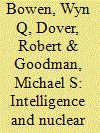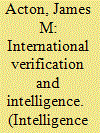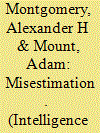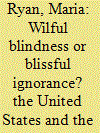|
|
|
Sort Order |
|
|
|
Items / Page
|
|
|
|
|
|
|
| Srl | Item |
| 1 |
ID:
131602


|
|
|
|
|
| Publication |
2014.
|
| Summary/Abstract |
This article explores whether the IAEA intelligence apparatus is being stymied by divisions between IAEA member states over how to respond to cases of non-compliance. The first part of the paper charts the key developments in the Department of Safeguards since the early 1990s - all of them authorized by the Board of Governors - that have increased the Secretariat's technical ability and legal authority to acquire and analyze evidence of illicit nuclear activities. The second part of the paper explores some of the political difficulties associated with implementing this expanded mandate and using it to hold states to account, drawing primarily on the IAEA Syria file. This case study indicates that however technically proficient and proactive IAEA monitoring becomes, reliable intelligence will not necessarily improve the global nuclear governance unless member states accept IAEA intrusiveness and develop a common understanding of proliferation threats and the need to deal with them decisively.
|
|
|
|
|
|
|
|
|
|
|
|
|
|
|
|
| 2 |
ID:
131605


|
|
|
|
|
| Publication |
2014.
|
| Summary/Abstract |
Intelligence is a critical component for all counter-proliferation activities. It allows us to assess and determine what makes up the current threat environment in terms of the proliferation of nuclear weapons and technology. When informed with an accurate assessment of the situation, policy-makers are better suited to counter the proliferation threat. However, success and failure hinge upon how well information is managed during the intelligence process. The intelligence process as it relates to estimating nuclear capabilities or intentions is wrought with many challenges and complications. The denial and deception techniques employed by states running covert weapons programs and the dual-use nature of many weapons components create many difficulties for intelligence organizations. Additionally, illicit transnational networks obscure the situation further by serving as a source, for both nation states and non-state actors, for acquiring dual-use commodities and technologies. These challenges can lead to the miscalculation of a state's capabilities or intentions, as witnessed with the case of Iraq in 2003 when western intelligence services grossly overestimated the capabilities of Saddam's regime. This paper presents a comparative analysis of three cases of nuclear proliferation: India's 1998 nuclear tests, the exposure of the A. Q. Khan network and Iran's nuclear program. Drawing from the analysis, the authors examine the lessons learned and propose recommendations for future counter proliferation policy and strategy.
|
|
|
|
|
|
|
|
|
|
|
|
|
|
|
|
| 3 |
ID:
131600


|
|
|
|
|
| Publication |
2014.
|
| Summary/Abstract |
Intelligence has long played an integral role in the context of western and broader international responses to the proliferation of nuclear weapons and efforts to contain the associated technology, materials and expertise. There are, of course, many challenges associated with accurately assessing proliferation intentions, processes, programmes and the underlying scientific and technical wherewithal. There is also an uneven record in this respect.
|
|
|
|
|
|
|
|
|
|
|
|
|
|
|
|
| 4 |
ID:
131603


|
|
|
|
|
| Publication |
2014.
|
| Summary/Abstract |
Both national intelligence agencies (NIAs) and international verification organizations (IVOs) attempt to assess compliance with arms control treaties. Their strengths and weaknesses are complementary. Because IVOs are seen as legitimate, they are able to conduct on-site inspections to verify declared activities and to confirm or disprove allegations of clandestine cheating. NIAs are more flexible and have a greater ability to uncover preliminary evidence of clandestine activities on which further investigations can be based. Such investigations require NIAs to share intelligence with IVOs. While this kind of intelligence sharing is generally permitted by arms control agreements, it is controversial. Nonetheless, it appears to have become more common in recent years, particularly during the International Atomic Energy Agency's investigation of Iran's nuclear program. While intelligence sharing creates risks for both IVOs and NIAs, it is ultimately critical to the effective verification of arms control agreements and steps can and should be taken to ensure it becomes more common and less controversial.
|
|
|
|
|
|
|
|
|
|
|
|
|
|
|
|
| 5 |
ID:
131604


|
|
|
|
|
| Publication |
2014.
|
| Summary/Abstract |
Various policy options have been proposed for slowing or halting the spread of nuclear weapons, yet all rely on sound intelligence about the progress of nuclear aspirants. Historically, the United States' record of estimating foreign weapons programs has been uneven, overestimating the progress made by some proliferators while underestimating others. This paper seeks to catalogue and evaluate the intelligence work surrounding 16 of the 25 states that are thought to have pursued nuclear weapons and to provide a framework for evaluating the causes of distorted intelligence estimates of nuclear proliferation. In particular, we identify 12 specific hypotheses related to politics, culture, bureaucracy and organizational culture, then explore how they play out in practice through two case studies (North Korea and Israel). We find that the US has overestimated nuclear programs much more frequently than it has underestimated or correctly estimated them.
|
|
|
|
|
|
|
|
|
|
|
|
|
|
|
|
| 6 |
ID:
131606


|
|
|
|
|
| Publication |
2014.
|
| Summary/Abstract |
This article argues the importance of technical accountability (national government responsibility for plausible technical explanation of past design, acquisition or production decisions, engaging fully with focused international expert questioning) for the reliable verification of disarmament and arms control, traces its absence and underappreciated significance during the Iraq Compliance Crisis, makes the case for the systematic international cultivation and strengthening of a strong general Technical Accountability Obligation (TAO) in future treaty interpretation and enforcement, considers political objections and proposes modalities to overcome them.
|
|
|
|
|
|
|
|
|
|
|
|
|
|
|
|
| 7 |
ID:
131607


|
|
|
|
|
| Publication |
2014.
|
| Summary/Abstract |
This article examines the successful denuclearization of Iraq by the International Atomic Energy Agency (IAEA) in the early 1990s and the apparent failure of the US Intelligence Community (IC) to rethink its assessments of Saddam's desire for nuclear weapons despite Baghdad's co-operation with the IAEA inspectors, and clear evidence from the Ongoing Monitoring and Verification team that this was a highly successful process. US policy towards Iraq, from the Clinton administration onwards, was hyper-politicized; it relied on a default, unchanging view of Saddam Hussein as a rogue leader bent on WMD acquisition and regional domination in an area that was of vital importance to the United States. The article also considers the impact of the fractious UNSCOM inspections process and argues that this was severely compromised by political intrusion, which was also ignored by the US IC in its assessments of Saddam's intentions. Ultimately, US intelligence on Iraq was filtered for a decade through a hyper-politicized lens that tended to discount evidence from the IAEA that disproved pre-existing assumptions.
|
|
|
|
|
|
|
|
|
|
|
|
|
|
|
|
|
|
|
|
|